It’s been said that this puto recipe actually originated from Japan and other countries in Asia such as Thailand, Malaysia, Indonesia, and China. But it’s a favorite in the Philippines too!
Puto is a steamed rice cake that comes in a lot of varieties, both sweet and savory. One of the most common toppings is cheese, and it has a savory taste and melt-in-your-mouth texture.
Puto has been a frequent sight during festivities and in Filipino households. It’s like the bibingka and is already adopted as a Filipino food!
It can also be served as a simple snack or as “food to go” when you need something to eat but you can’t have a real meal yet. Since it’s made from rice, puto can make you feel full when hunger suddenly strikes.
The recipe I’m sharing is so easy to make, it’ll become a favorite for those days when you don’t feel like cooking!
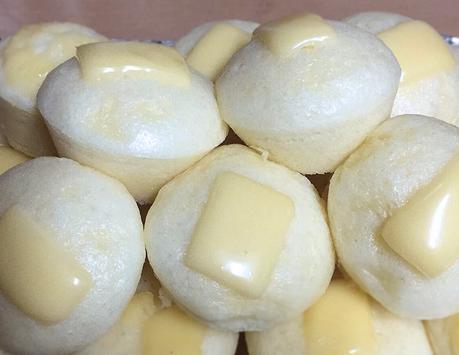
Puto recipe and variations
Throughout the years, there have been variations of the puto recipe. It now comes in different flavors and even the shapes and colors have evolved!
In the past, it was just plain steamed rice cakes with no additional flavors. The color was just white, but in recent years, puto became colorful too; pink, green, violet, and yellow. A bit of food coloring instantly elevates the appearance of this dish!
Of course, this just makes it more enticing to try.
Who wouldn’t be eager to try something so colorful? Even the aroma of puto is mouthwatering because of the additional flavors that everyone will surely love.
Pandan leaves can be added while steaming puto to come up with the wonderful aroma and taste of the puto-pandan.
There’s also the ube-puto and latest craze, the puto pao, where there are meat fillings just like the siopao. Another famous variety is the puto biñan, an all-time favorite!
But today, I’m sharing a cheese puto recipe with you. It’s perfect if you want something savory.
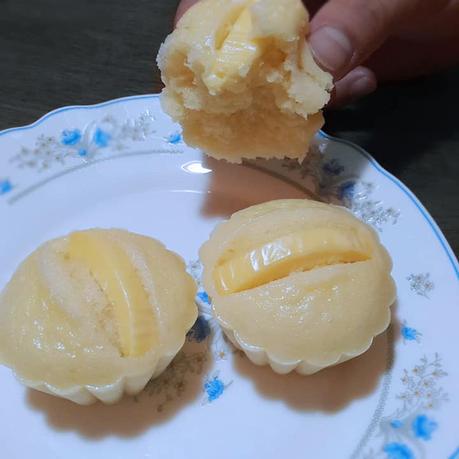
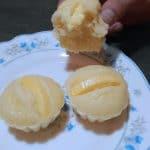
Filipino puto recipe (puto cheese)
This puto recipe (or puto cheese) has been a frequent sight during festivities in the Philippines. It's also a common snack in households. Just like the bibingka, it's already considered a Filipino food. Check out my special recipe! Course SnackCuisine FilipinoKeyword Cheese, Puto Prep Time 15 minutesCook Time 15 minutesTotal Time 30 minutes Servings 36 pcs Calories 123kcal Author Joost Nusselder Cost $5Ingredients
- 2 cups rice flour
- 11/4 tsp baking powder
- ½ tsp refined salt
- 1 cup white sugar
- 1 large fresh egg
- 1 cup evaporated milk
- ½ tsp vanilla extract
- 2 cups water
- 1/4 cup butter unsalted and melted
- 36 pieces cheese cubes ( for toppings) Cheddar or Edame
- Food coloring (optional) yellow
Instructions
- Sift the dry ingredients (flour, baking powder, sugar, and salt) into a bowl. Make sure they're thoroughly sifted. Set aside.
- Beat the egg, then add the evaporated milk, vanilla extract, and water. Mix thoroughly.
- Make a hole in the center of the dry ingredients. Then pour the wet ingredients into the hole and mix continuously.
- Mix thoroughly until the texture is smooth and soft and all lumps are gone.
- If you opt for food coloring, separate the mixture, then add the color (and essence/flavor). Mix well.
- Pour into your desired mold until it's 3/4 of the way full.
- Place in a steamer and cook for 10-12 minutes and remove the puto.
- Now add one cheese cube on top of each cake and steam for an additional minute or two.
- Remove from the steamer and let it cool.
- Serve with dinuguan (optional).
Nutrition
Calories: 123kcalCooking methods
The traditional method of preparation and cooking takes a few hours.
They used to place a sheet of katsa over the ring of the steamer, then the rice batter was poured onto it directly. Others use banana leaves as a substitute for katsa.
When cooked, it was placed in bilao and divided into pieces.
But nowadays, preparing and cooking puto doesn’t take that long anymore! It’s easier and faster because it’s mostly just baked.
The shapes vary too; it’ll just depend on the one preparing it which to choose. Some are shaped like cupcakes while some are shaped like stars.
If there are kids in the house, you can use the molds that’ll excite them and make them enjoy eating puto more.
Cheese puto is such a popular food because it’s the perfect combination of fluffy delicate rice dough, tangy cheese, and a bit of sweetness from the milk.
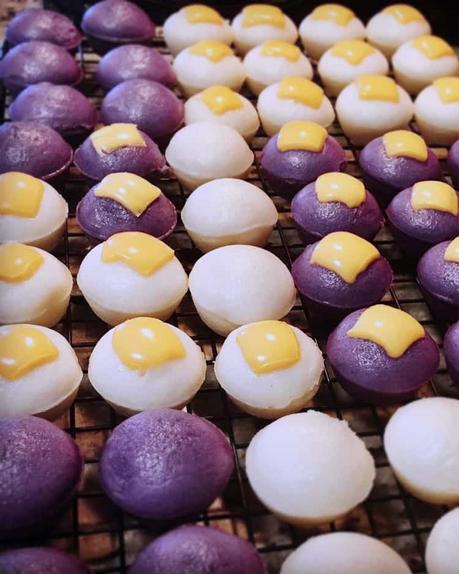
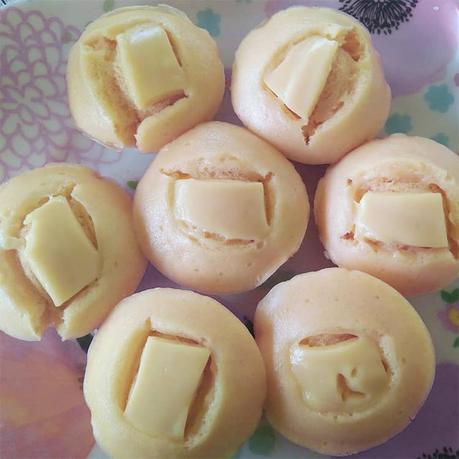
The most famous combination of puto is with dinuguan (pork stew). Puto with salted egg is also one delicious variety.
If you’re serving Filipino cuisine, it’d be nice to have kutsinta, biko, puto-bumbong, bibingka, cassava cake, and sapin-sapin to partner with your homemade puto.
The best drink to partner with this is sago and gulaman. It’ll complement each other and your guests will absolutely love this after eating the Filipino dishes you’ve served them!
After a hearty main course, puto is the best way to end a meal.
Substitutions and variations
If you want to make puto healthier, or you just don’t like some of the ingredients, you can do some substitutions. You can also make this dish vegan if you want!
Here’s what to substitute:
- You can skip the evaporated milk and use nut milk (almond, cashew), oat milk, soy, and coconut milk.
- Skip white sugar and replace it with brown sugar or unrefined sugar.
- Substitute cheddar with vegan cheese.
- You can also use vegan butter and vegan egg. The recipe still works without eggs or egg substitutes but the cake may be crumblier than usual.
If you’re feeling lazy, you can put each uncooked cake in your rice cooker and steam them that way!
Nutritional information about puto
Cheese puto is a relatively healthy food/snack. Each piece has about 120-150 calories depending on the toppings and filling. The cheese puto has approximately 120 calories. In addition, it has about 6 grams of fat, 88 mg of sodium (a bit much), and 9 grams of carbohydrates.
But puto is also a good source of vitamin A, calcium, and iron. In addition, it’s also healthy because it contains protein and fiber. Here are some other nutritional facts about cheese puto:
- This food is low in cholesterol, as each piece has about 30 mg. If you substitute evaporated milk with coconut milk, it’s even healthier.
- Since the dish is steamed, it doesn’t require the use of oil and it’s not greasy.
- Rice flour converts into energy for the body.
So you can enjoy eating puto while getting the health benefits it gives. Salamat!!
